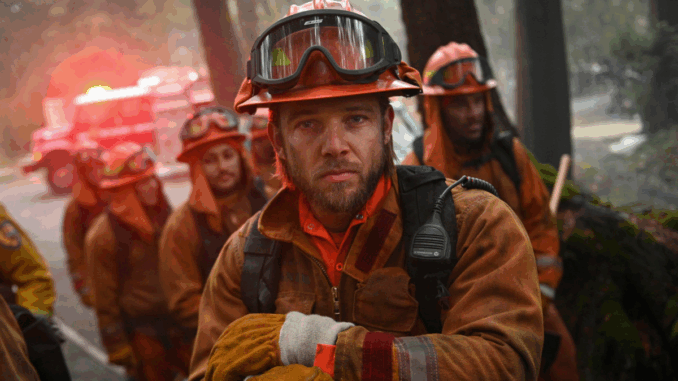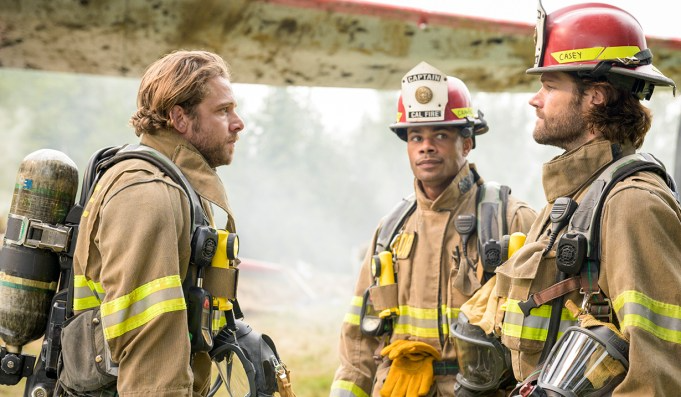
Amid the flames, collapsed buildings, and heart-pounding rescues, Fire Country tells a deeper story—one about trust, sacrifice, and the unbreakable bonds formed between people who survive the unimaginable together. While the series delivers gripping action and complex family drama, it’s the chemistry and code of loyalty between its firefighters that turns the firehouse into more than a workplace—it becomes a surrogate family.
In Fire Country, teamwork isn’t just an operational necessity. It’s a lifeline. It’s built under pressure, tested in crisis, and often paid for in sweat, blood, and tears. Whether it’s the Edgewater crew or the inmates of the fire camp, the show honors the unspoken code that governs first responders: you never leave your partner behind, no matter what.
Let’s explore how Fire Country masterfully portrays teamwork, and why that portrayal resonates with audiences across generations and backgrounds.
Life on the Fireline: No Room for Lone Wolves
The essence of firefighting lies in trust. You depend on the person beside you to keep you alive—and to do their job without hesitation. In Fire Country, this reality is more than a dramatic backdrop; it’s a constant force that shapes every character interaction.
From the very first episodes, we see how deeply interdependent the crew is. No one can succeed alone. Eve and Jake, for example, are experienced and competent in their own right, but it’s their ability to read each other in high-stress scenarios that saves lives. Sharon Leone, the seasoned division chief, recognizes this: she doesn’t just build a team—she cultivates a firehouse culture where mutual respect and rapid communication are non-negotiable.
Bode’s entry into this system as both an outsider and an inmate forces the team—and the audience—to reevaluate assumptions about what trust looks like and how it’s earned.
From Convicts to Comrades: The Fire Camp Brotherhood
One of the show’s most powerful narrative choices is its focus on inmate firefighters, who are often overlooked in media. Fire Country sheds light on the California fire camps where incarcerated men risk their lives for minimal compensation—and, often, for a shot at redemption.
Bode’s bond with Freddy and the other camp members reveals a raw, stripped-down version of brotherhood. These men don’t have reputations to protect or social graces to maintain. What they do have is shared pain, second chances, and an understanding that the fire doesn’t care about your past—it only cares whether you show up and have your team’s back.
Over time, the fire camp inmates develop deep loyalty to each other. They fight not just for survival, but for dignity. This portrayal flips stereotypes on their head and shows how even the most broken people can become heroes—together.
Firehouse Friction: Conflict, Competition, and Resolution

Of course, Fire Country doesn’t pretend that teamwork is easy. It often depicts the friction that exists in close-knit teams, especially when lives are at stake and emotions run high. Characters clash—sometimes over procedure, sometimes over personal baggage.
Jake, for instance, struggles with jealousy and resentment, especially when Bode starts proving his worth in the field. Gabriela, caught between her father’s legacy and her budding connection to Bode, faces pushback from those who question her loyalties. These interpersonal conflicts are not melodrama—they reflect the real tension that can build when trust is earned under fire, but threatened by history or emotion.
What makes these moments compelling is that resolution doesn’t come through grand apologies or sweeping forgiveness. It comes through action. Through moments where one firefighter covers for another, where someone steps up even after a betrayal, where respect is restored not by words, but by courage.
Leading from the Front: The Command Dynamic
Strong leadership is essential in any high-risk team, and Fire Country explores the complexities of command in crisis. Sharon and Vince Leone embody two very different leadership styles—Sharon leads with empathy and strategy, Vince with toughness and discipline. Both styles have merit, and both are challenged throughout the series.
These dynamics raise important questions: What kind of leadership inspires loyalty? When do you follow orders, and when do you speak up? The show doesn’t offer a single answer, but it reveals that effective leadership is less about control and more about knowing your people and earning their trust daily.
Even Bode, despite his rank at the bottom of the chain, becomes a natural leader among his peers—not by title, but by showing courage, taking responsibility, and lifting others up when they falter.
Camaraderie in Crisis: What Real Loyalty Looks Like
Some of Fire Country’s most emotional scenes happen not during the fires, but in the aftermath—when team members check in on each other, offer quiet reassurances, or break down privately. These moments capture the emotional labor that comes with being part of a team in extreme environments.
Whether it’s Freddy covering for Bode, Eve supporting a struggling colleague, or Vince reluctantly admitting his pride in Bode’s growth, these subtle beats show that loyalty isn’t about blind obedience—it’s about showing up consistently, even when things get hard.
The show also highlights the diversity within its teams—racially, emotionally, and experientially. By doing so, it challenges viewers to understand that camaraderie doesn’t require sameness. It requires shared goals, mutual respect, and the willingness to risk everything for each other.
Humor, Ritual, and the Culture of Belonging
Despite the heavy subject matter, Fire Country makes room for humor, inside jokes, and rituals. These aren’t just for entertainment—they’re coping mechanisms, essential to morale and mental health. Firehouse meals, teasing banter, celebrations after tough calls—these are the glue that holds the team together when everything else feels unstable.
This balance between high stakes and human connection makes the show feel authentic. It reminds us that camaraderie isn’t just forged in battle—it’s built in quiet moments, too. And that laughter, even in a firehouse, is part of survival.
Conclusion: A Brotherhood Forged in Flame
Fire Country delivers thrilling action and heart-wrenching drama, but its greatest achievement may be its nuanced, respectful portrayal of teamwork in one of the most dangerous professions in the world. The series understands that true loyalty isn’t automatic—it’s earned under pressure, tested by crisis, and proven when the stakes couldn’t be higher.
Through Bode, Sharon, Vince, Eve, Freddy, and the rest of the crew, we see that the strongest bond isn’t blood—it’s the willingness to risk everything for people who’ve earned your trust.
In a time when division often dominates our screens, Fire Country offers something more powerful: a vision of unity born not from sameness, but from shared purpose, mutual sacrifice, and fire-tested loyalty.
